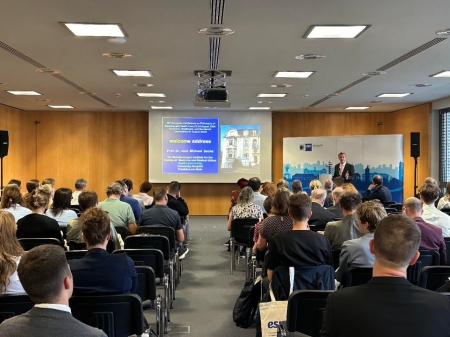ESPMH Conferenza 2024

NOTA. Alla Conferneza ha partecipato il Cancelliere della Pontificia Accademia per la vita, mons. Renzo Pegoraro. Erano presenti anche la prof.ssa Sheila Tlou e il prof. Stephan Sahm, nostri Accademici. Il prof. Sahm è l'Autore del seguente articolo che riassume i temi trattati.
There is no country in the world where the explosion in healthcare costs is not being discussed. This applies first and foremost to the rich, developed countries. In poorer countries (middle-income or low-income countries with a low gross national product), the question is different: how can the population be given access to medical care at all?
This is one of the great moral questions of our time. In developed countries, the academic discipline of ‘medical ethics and bioethics’ has been established for decades, and in all these countries there are bodies that advise governments and administrations. Ethical challenges of modern medicine, such as the fair distribution of organs, regulations on organ donation, questions of medicine at the end of life (currently assisted suicide) and more are discussed there. The focus of attention and scientific work is almost always on the problems in the respective countries. The global perspective is a blind spot. There is, for example, the blatant inequality throughout the world, considering how many people on earth have no access to even basic medical care. Medical ethics and bioethics must take a global perspective. As can be seen, this is also in the interests of rich countries.
In view of the abundance of cross-border issues, it is necessary to maintain an international dialogue when discussing these questions and advising decision-makers in the respective governments and parliaments. To this end, the European Society for Philosophy of Medicine and Health Care (ESPMH) was founded four decades ago. This association brings together academically recognised representatives of medical ethics and bioethics from all over Europe. Many are sought-after advisors in their home countries and are active in international bodies such as the World Health Organisation. Every year, the experts meet in a different European country to exchange ideas. This year, they met in Offenbach and Frankfurt from 21-24 August. The congress was organised by the Catholic non profit Ketteler Hospital, Offenbach, and the Senckenberg Institute for History and Ethics in Medicine at the University of Frankfurt. In this way, the Ketteler Hospital aims to fulfil its social mission as a church hospital and its positioning in society both locally and globally. The Ketteler Hospital not only seeks intellectual discussion in and with society, but also provides practical help by making rooms available in the hospital for consultation hours for people without health insurance.



